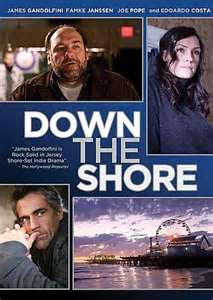You’ve really gotta hand it to James Gandolfini – in the iron-hot days immediately following his 10-year run as the greatest television character of all-time, dude had the prudence to step back and allow his typecast image some much-needed room to breathe.
When at last Gandolfini did emerge (at least as an actor way up on the big screen), it was via a string of off-beat roles that spoke much more to rebelling against that image than they did his clinging to it (e.g., In the Loop, Where the Wild Things Are, Welcome to The Rileys, etc.).
And yet slowly, over the past few years, Gandolfini has subtly immersed himself in those waters once more, only this time via a cadre of supporting turns, in films like Killing Them Softly, Not Fade Away, and (available in limited release as of this coming Friday) the 2011 indie drama, Down The Shore.
Forget about the fact this type of role represents Gandolfini’s stock-in-trade, and consider for a moment how much it speaks to innate depth. I mean, in a sense, James Gandolfini has taken that whole “do-one-for-them-and-then-do-one-for-me” thing and turned it on its ear. What’s more, given his highly-documented disdain for all-things-Hollywood, one can only assume Gandolfini accepts these roles out of sheer reverence for the work.
According to past interviews, Gandolfini worked his way up on the nightclub circuit prior to breaking into film. To assume this offered much-needed fodder would be to miss the point entirely. The more likely scenario would be that Gandolfini cottons to a specific mold because it speaks to who he is – to where he’s from, and what he’s done.
In that spirit, Down The Shore presents the actor in that classic Jersey brand – sporting the accent, assuming the lumber, even removing that partial cap from his front tooth. And yet, the circumstances surrounding this film are really anything but nostalgic. There’s death and double-cross, betrayal and deceit, all set against the backdrop of a modern-day class war. Socialism, Capitalism, all for one or none for all? These are the themes Down The Shore is consumed with, and they’re at the very heart of Gandolfini’s role.
The reality is, if you’re familiar with any of the small-town politics surrounding the New Jersey shore, then you also understand why it’s a fool’s errand to keep any outdoor amusement open after November (much like Gandolfini’s Bailey does throughout Down The Shore). Metaphorically speaking, I imagine that’s kind of the point. The only problem being, Guskin’s movie hinges itself far too heavily on that premise. And the damage is only compounded by the way the last half hour just kind of forces everything together, running roughshod over all the delicate care it took to get there.
And yet, despite that, Down The Shore is still a semi-entertaining affair, thanks in large part to the actors who stepped up to fill each role. There’s that kid who played Gandolfini’s son in David Chase’s Not Fade Away. There’s the gorgeous Famke Janssen, who’s dressing down to fit the bill. And then, of course, there’s Gandolfini, who just keeps right-on giving till it hurts. In the end what it all adds up to a middling small-town drama, steeped in the rather bold presumption that we are all our brothers’ keepers, and – as such – we are all stuck in this together.
(Down The Shore arrives at The Quad in New York City this coming Friday.)

